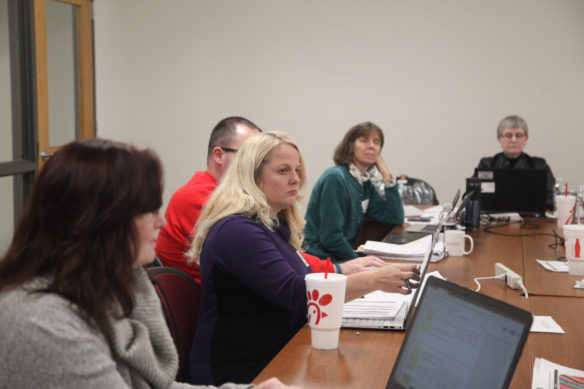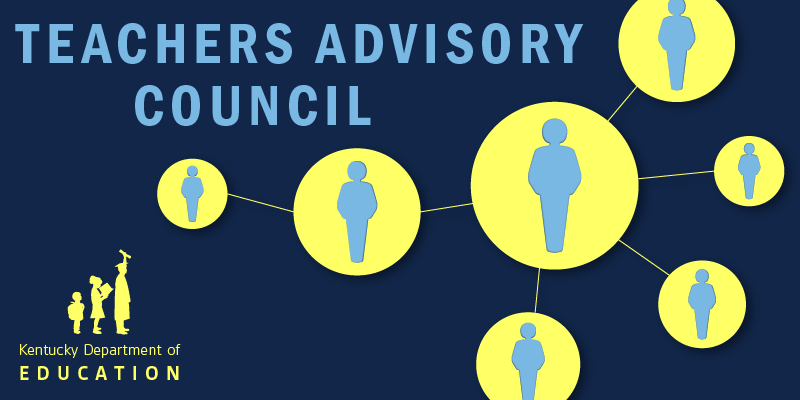
Members of the Kentucky Department of Education’s Social Studies Advisory Panel discuss feedback on the proposed social studies standards revisions during a meeting in Frankfort.
Photo by Megan Gross, Dec. 11, 2018
- A KBE committee asked for further review of the proposed standards to address concerns raised in public feedback.
- The advisory panel worked to ensure that the proposed standards contain critical content and to consider suggestions to clarify the distinction between standards and curriculum.
By Mike Marsee
mike.marsee@education.ky.gov
As the Kentucky Department of Education (KDE) moves closer to revising its social studies standards for the first time in more than a decade, the proposed standards are being reviewed by an advisory panel and a review committee to address concerns from the Kentucky Board of Education (KBE).
The board’s curriculum, instruction and assessment committee asked KDE staff members and those involved in the process of revising the standards to ensure that the proposed standards contain critical content and to consider suggestions to clarify the distinction between standards and curriculum.
The Social Studies Advisory Panel – which consists of elementary school, middle school and high school teachers and representatives from postsecondary education and the Kentucky business community – took up that task Dec. 11 in Frankfort
“The teachers took today to respond to the feedback from the board of education, and they are currently thoughtfully considering and responding to the comments and working to provide additional clarity to the documents,” said Lauren Gallicchio, KDE’s social studies consultant.
A subcommittee of the advisory panel met Dec. 12 to continue providing clarifications to the standards document. That work will be submitted to the Social Studies Standards Review and Development Committee, which will meet Dec. 14 in Frankfort to consider the revisions.
“They will review the feedback and the work done by the panel and provide any revisions needed,” Gallicchio said.
Gary Houchens, who chairs KBE’s Curriculum, Instruction and Assessment Committee, said at the board’s Dec. 5 meeting that the proposed standards are much better than the existing Kentucky Academic Standards for Social Studies, which were last revised in 2006. At the same time, he said, it is important that they result in the teaching of significant historical events and figures, even if those things aren’t spelled out in the standards.
“I do think it’s helpful to make it clear that we expect students to learn more than what is explicitly stated in the standards. It’s probably also necessary to say that just because we name something in the standards doesn’t mean that it will necessarily get taught or that students will master that material,” Houchens said. “That said, when it comes to social studies, content is a really important part of the standards.”
“I’d like you to look through standards again to see, ‘Have we missed something. Have we failed to clarify?’ If it’s possible that we missed something somewhere, I think we should take those considerations to the table and see if there’s more than can be done between now and the next reading, bearing in mind that there is a tipping point at which we venture into that point of curriculum writing, which is not our responsibility or something we’re even allowed to do under the law.”
Senate Bill 1 (2017), which calls for KDE to implement a process for reviewing and revising all academic standards and aligned assessments, also states that new standards must be written by teachers.
“The standards are written by Kentucky teachers, and we really value and appreciate their hard work in coming to the department to evaluate the feedback, and we appreciate their dedication to the process,” Gallicchio said.
The Social Studies Advisory Panel discussed the specificity concerns that were brought before the board. The panel was asked to address specific comments and to determine whether content was covered either explicitly or implicitly in the standards.
The panel also considered disciplinary clarifications – information providing further explanation or examples to further clarify the meaning or intent of a standard – and additional instructional support for standards for grades K-8.
“The standards will be a resource for teachers across the state,” said Krista Hall, director of KDE’s Division of Program Standards. “The writing teams are working to keep the social studies content true and accurate, but also to recognize that stakeholders using the document have all different skill levels and experience levels. The writers are creating that document to support all levels of expertise.”
Gallicchio said the advisory panel members welcomed the chance to tackle the KBE committee’s concerns.
“They valued the constructive feedback and appreciate any opportunity to make the document clearer to serve the best interests of Kentucky students,” she said.
More than 1,200 people responded during a public comment period on the proposed standards last winter, providing more than 5,000 comments. Responses came from 76 percent of Kentucky’s 120 counties, and 78 percent of the respondents were current classroom teachers.




Thank you for the update. We have been working for a long time now on a social studies revision and it is good to see other being aware of the importance that this area holds within our curriculum.